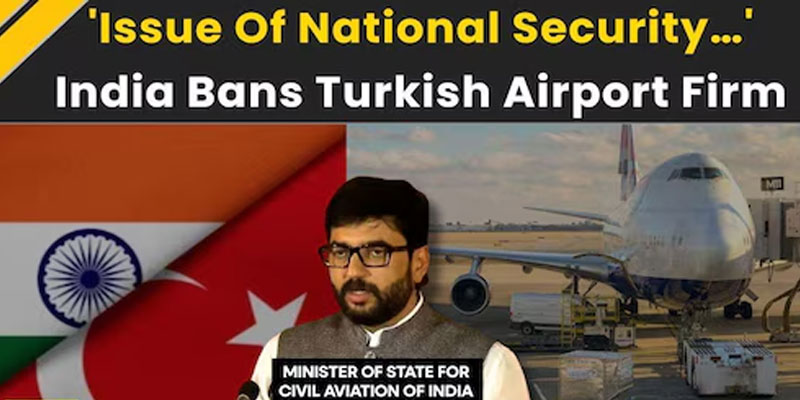A significant fallout is underway in India’s aviation sector as major airports move swiftly to terminate contracts with Turkish-origin ground handling firm Çelebi Aviation. Following the Indian government's decision to revoke Çelebi's security clearance citing national security concerns, key airports in Delhi, Mumbai, and Ahmedabad have ended their agreements with the company. This coordinated action marks a major shift in India's stance on foreign-linked enterprises with strategic vulnerabilities.
In statements released by both Mumbai’s Chhatrapati Shivaji Maharaj International Airport (CSMIA) and Ahmedabad’s Sardar Vallabhbhai Patel International Airport (SVPIA), the airports confirmed they had terminated ground handling agreements with Çelebi and directed the company to hand over operations immediately. They reassured stakeholders that new service providers had been engaged and existing Çelebi staff would be retained under the same employment terms.
From Operation Dost to Strategic Betrayal: The Background
India’s actions come against the backdrop of a broader geopolitical shift. Despite India’s generous humanitarian support to Turkey during the devastating 2023 earthquake through Operation Dost, Ankara’s subsequent alignment with Pakistan in military and strategic affairs has soured bilateral sentiments. Turkey’s supply of drones and military operatives to aid Pakistan during heightened India-Pakistan tensions was seen as a direct betrayal of India’s goodwill.
Public outrage has spilled onto the streets and social media platforms, with widespread calls for a boycott of Turkish products, tourism, and businesses. Indian celebrities, military veterans, travel firms, and film producers have joined the protest, further deepening Turkey’s economic isolation in the Indian market. Bookings to Turkey reportedly dropped by over 250%, and cultural institutions like Jawaharlal Nehru University (JNU) have suspended academic agreements with Turkish counterparts.
The Çelebi Fallout: Ground Handling Firm Caught in Geopolitical Crossfire
On May 16, India’s Bureau of Civil Aviation Security (BCAS) formally revoked the security clearance of Çelebi Airport Services India, a subsidiary of Istanbul-based Çelebi Aviation Holding. The revocation, applicable to all associated entities, was grounded in national security assessments—effectively halting Çelebi’s operations across the nine Indian airports it serviced.
These include high-traffic locations like Delhi, Mumbai, Bengaluru, and Hyderabad, where Çelebi managed critical ground functions such as baggage handling, aircraft maintenance, cargo management, and ramp operations. Çelebi claimed in a media statement that it handled 58,000 flights and 540,000 tonnes of cargo annually and employed over 10,000 Indians.
The company insisted it is “a truly Indian enterprise” led by local professionals and funded by institutional investors. It also denied social media claims that Sümeyye Erdoğan Bayraktar, the daughter of Turkish President Recep Tayyip Erdoğan, held a stake in the company—calling such assertions “factually incorrect.”
Nevertheless, the damage had been done. As national security took precedence, Indian authorities and airport operators began the systematic replacement of Çelebi with indigenous players such as AI Airport Services, Bird Group, and Air India SATS, all of which are capable of taking over without disrupting airport operations.
Track-II Offensive: India’s Non-Governmental Response to Strategic Hostility
While the government’s response has been firm, a Track-II diplomatic offensive—driven by civil society, veterans, and industry—has simultaneously emerged as a powerful countermeasure to Turkey’s support of Pakistan. From tourism boycotts to halting commercial partnerships, India’s civil ecosystem is actively reinforcing the geopolitical message: goodwill cannot be met with duplicity.
Turkey’s deepening ties with Pakistan and Azerbaijan, and their collective condemnation of India’s Operation Sindoor strikes against terror camps, have further alienated Ankara from New Delhi. Together with China, these nations form a strategic bloc often opposed to India’s security and regional interests. This has only bolstered New Delhi’s resolve to decouple critical infrastructure partnerships from nations that compromise its security calculus.
Strategic Sovereignty and Economic Retaliation Go Hand-in-Hand
India’s decision to revoke Çelebi’s security clearance and the rapid exit of the company from major airports is more than a commercial development—it is a declaration of strategic sovereignty. In a world increasingly shaped by geopolitical alignments, national security is no longer limited to borders but extends into corporate linkages, trade, and logistics.
The Çelebi episode serves as a warning to foreign enterprises operating in India: alignments matter. India may offer friendship in times of need, but it expects that goodwill to be reciprocated—not undermined. As India builds a resilient and secure future, it is sending a clear message—those who stand against our security cannot expect to profit from our markets.
(With agency inputs)

LATEST NEWS





















